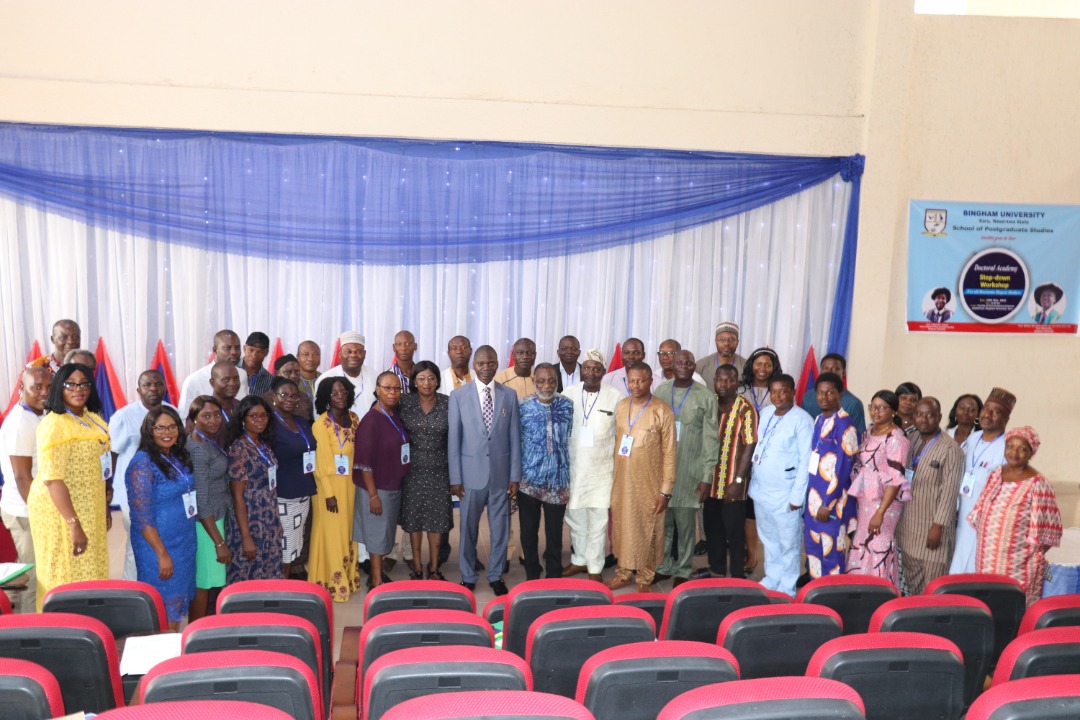
Bingham University’s School Of Postgraduate Studies Holds Doctoral Academy Step Down Workshop
Published on: May 24th, 2022
The School of Postgraduate studies recently held a one day Doctoral Academy Step-Down workshop for all Ph.D holders in the University.
The Vice-Chancellor, Prof William B. Qurix in
his welcome address stated that the workshop was in line with the University’s Vision “to become a world class University in knowledge and skills, while inculcating moral and spiritual values.
The Vice Chancellor added that education is gradually gravitating towards transnational learning which has led the University to signing an MOU with the University of Wolverhampton UK that will lead to Academic mobility. This will afford students the opportunity to study for 3years in Bingham University and spend 1year in the University of Wolverhampton leading to the award of double honours.
To encourage research in the University, the Vice Chancellor stated that the Research Policy Committee was set up and the University’s Research Policy was created as a guide to promote research. This also led to the creation of the Grant Office. The office is responsible for sourcing of grants locally and internationally. This has led to the research collaboration between Bingham University and Kaduna State University.
He added that the University’s Zankali Research Centre has been attracting both national and international collaborations. He stated that recently, the World Health Organisation was in the University to seek areas of collaboration on traditional medicine for the treatment of COVID-19 and other related diseases.
He commended the Postgraduate School for this initiative, adding that the workshop will improve the quality of Research in the University. He formally inaugurated the Doctoral Academy of Nigeria in the University.
Earlier, the Dean of Postgraduate Studies, Prof I.S Zabadi, in his opening remarks stated that the workshop was borne out of the historic decision taken by the Committee of Provosts and Deans of Colleges and Schools of Postgraduate Studies (CPDGCS) in Nigerian Universities, at its 59th meeting to establish the Doctoral Academy of Nigeria and tasked an implementation committee to organize the first event within four months. This was necessitated to address the deplorable state of Ph.D education in Nigeria. It was unanimously agreed that supervisors share some of the blame, and that action must be urgently taken to arrest the situation so as to make Doctoral education a rewarding and pleasurable experience.
He added that main aim of the Doctoral Academy of Nigeria is to strengthen postgraduate education, scholarship and research production in Nigeria by providing Supervisors, students, and young researchers with the opportunity to learn new approaches and skills in research.
The key objectives of the Academy are to: train postgraduate supervisors on mentoring, supervision and application of digital skills in training postgraduate students; offer high impact research methodology training for postgraduate students with particular reference on doctoral candidates; provide skills for academic writing, publishing and career development training and opportunities for networking among postgraduate students; among others.
The Dean also appreciated the Vice Chancellor and Management Staff for their support.
In the key note address, Prof Victor Dugga, Dean of Postgraduate Studies, Federal University Lafia, Nasarawa State, spoke on the topic “The Challenges of Transforming Doctoral Studies in Nigerian Universities”.
He stated that according to the Blair Commission for Africa, the following problems were identified in the context of African Universities in the Universe: shortage of requisite skills set in the public and private sectors, loss of skills through brain drain, weak higher education sector, weak scientific research capability and poor collaboration among key stakeholders.
Prof Dugga added that University education is to: make students think, feed and train their instincts to understand and seek meaning, question interpretation that were given to them, reduce the chaos of information to the order of analytical argument, seek out what is relevant to the resolution of a problem and identify problems for themselves and to resolve them by rational argument supported by evidence.
He gave some suggestions to improving research in Nigeria by: sharing facilities; establishment of more doctoral programmes; expand pool and increase the rate of production of Ph.D graduates while not jeopardizing quality; substantial increase in investment in doctoral education; strong linkages should be developed between Universities, communities, industry and government as well as international partnerships.
In conclusion, he drew words from E.I Braide “the quality of graduates produced as well as the quality of research outcomes depend majorly on the quality of supervision and mentorship received. For supervisors, there is the twin task of mentoring. The aim should be to equip the students with knowledge and skills while also proving guidance for career direction and progression”.
Resource persons at the workshop were: Prof I.S Zabadi, Assoc. Prof B.J Okoli and Assoc. Prof Angela Danborno.

